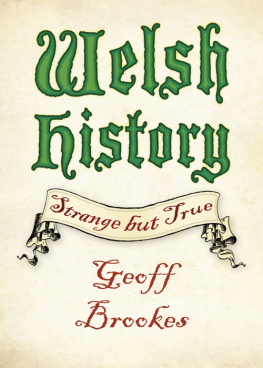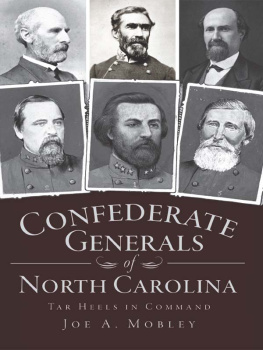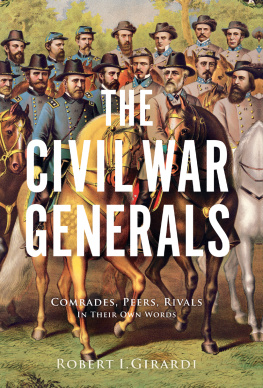MEDICAL HISTORIES OF CONFEDERATE GENERALS
Medical
Histories of
Confederate
Generals
BY JACK D. WELSH, M.D.
The Kent State University Press
Kent, Ohio, and London, England
1995 by The Kent State University Press, Kent, Ohio 44242
All rights reserved
Library of Congress Catalog Card Number 94-8673
ISBN 0-87338-505-5
ISBN 0-87338-649-3 (pbk.)
Manufactured in the United States of America
06 05 04 03 02 01 00 99 5 4 3 2
L IBRARY OF C ONGRESS C ATALOGING-IN -P UBLICATION D ATA
Welsh, Jack D., 1928-
Medical histories of Confederate generals / by Jack D. Welsh.
p. cm.
Includes bibliographical references (p. ).
ISBN 0-87338-505-5 (cloth : alk. paper)
1. United StatesHistoryCivil War, 1861-1865Medical care. 2. Generals Medical careConfederate States of America. 3. Confederate States of America. Army. 4. United StatesHistoryCivil War, 18611865Medical care Bibliography.
5. Medicine, MilitaryConfederate States of America. I. Title.
| E625.W45 1995 | 948673 |
| 973.775dc20 | CIP |
British Library Cataloging-in-Publication data are available.
Dedicated to
R OBERT M ONTGOMERY B IRD , M.D .
February 1, 1915December 30, 1976
Friend, Mentor, Teacher,
Physician, Virginian
Contents
I N THE LIMITED space allowed, I cannot adequately express my deep thanks to the literally hundreds of individuals who have contributed to this project over the years. Many searched local, family, archival, and newspaper records during lunch hours, weekends, and evenings. Appreciation should be expressed also to all those who made a stranger feel welcome, who answered my inquiries and helped me make the transition from one research world based on observations, experiments, and statistics, to one with even more uncertainties. Dr. Richard J. Sommers, Archivist-Historian, Department of the Army, U.S. Army Military History Institute, Carlisle Barracks, Pennsylvania, consistently shared his broad knowledge, understanding, and patience. Michael P. Musick of the National Archives was always able to find just what I needed or to provide that extra source of information. Dr. LeRoy H. Fischer, Oppenheim Professor of History, Emeritus, Oklahoma State University, provided encouragement over the years. Madel Morgan, Director, Archives and Library Division, State of Mississippi Department of Archives and History, and Richard A. Shrader, Reference Archivist, Southern Historical Collection, The University of North Carolina at Chapel Hill, stand out as individuals who displayed professionalism and wonderful understanding.
Two who made unique contributions were Dennis E. Todd of Cayce, South Carolina, and E. M. Clark, Jr., of West Columbia, South Carolina, who shared information on the generals burial sites. One or both have visited over half of these sites and verified the information. Without these data it would not have been possible to determine the cause of death in many cases.
Typing from my illegible notes and collating the information over the years were Debby Ann Frazier, Annis Dick, Glenda Dickson, Margaret M. Thompson, and Kristi Wasson. Mrs. Thompson was particularly helpful when I needed her to put it all together.
The dean of the University of Oklahoma College of Medicine, the provost, and the Board of Regents are to be commended for their enlightened view in allowing a six-month sabbatical for research in an area away from the cutting edge of modern medicine. Col. David A. Peura, M.D. (Ret.), and his wonderful wife, Kristin, provided a place to stay during my visits to Washington, D.C. Dr. John T. Hubbell, Director of The Kent State University Press, made the call expressing an interest in the manuscript and made it possible to reach this point. Linda Cuckovich, Assistant Editor, not only took care of the multitude of editing details but tried to understand why I did all of this in the first place. She also became interested in the lives of the generals. Thanks also go to Diana Gordy, who supervised the design of this volume, and to Julia Morton and Flo Cunningham, both of whom offered valuable suggestions in the early stages.
The one who put up with the most during this period has been my secretary, Sylvia B. Mason, who had to contend with house officers, patients, and the medical academic world and still try to locate death certificates and shift her thinking to the mid-1800s.
E ZRA J. W ARNER stated in his preface to his book Generals in Gray that his interest was aroused by reading Douglas Southall Freemans Lees Lieutenants. The idea to research medical-related material for this book was also stimulated by reading this three-volume study. Freemans books, dealing with the command structure of the Army of Northern Virginia, frequently mention the absence of various offices because of wounds or illness, and the influence of the resulting changes in command on the military events. In pursuing my interest in the Civil War, it soon became apparent how little was recorded about these medical occurrences, and how difficult it was to find specific details. It was not clear why some men who had sustained a severe wound reappeared on the field in a few days or weeks, whereas others who had received a slight wound might not reappear. The types of wounds and how they were cared for were usually not mentioned. What specifically were the medical illnesses and how were they treated? Historians writing about the period often did not mention that a particular officer on the field was sick or had an unhealed wound. In other instances, medical events or interpretations have been reiterated without verification. As a physician, my interest was spurred by the paucity of information and inconsistencies. Consequently, I set out to compile a reference source on the medical histories (wounds, illness, accidents, and causes of death) of the 425 men described in Warners Generals in Gray. This population was chosen originally on the basis of well-defined criteria, and it included Confederate officers of most interest to students of the period.
Because this work represents a collection of medical histories, to include just the events that occurred during the Civil War would provide an incomplete story and be poor medical practice. Therefore, I attempted to find out as much as possible about all medical incidents in the life of each individual. To the reader, some events by themselves may appear inconsequential or extraneous, but they are recounted because they reflect the health of the individual and are a part of his medical history. In addition, a minimum of nonmedical information concerning civilian and military careers is included to further flesh out each mans medical story. Even if medical facts were not available, I include the individual in order to document that a search of all the usual sources has been made.
There are three things the avid Civil War student will not find in this study. First, no attempt has been made to analyze the effects of the individuals medical problems on a battle or on the war. I believe this approach is better left to the military historian with more knowledge, insight, and interpretative skills in the area. Second, there is an absence of heroics and glory. Once an officer became a patient, there was little glamour in a broken arm, a suppurating wound, a shaking chill, or a recently amputated limb. Third, the events are usually not detailed as regards their location on the battlefield or the opposing units involved because these data are of little medical importance and can be found elsewhere. What is presented, when known, are factors that may have contributed to the wound, injury, or illness, and the outcome. Information on the immediate care, logistics of transportation, timing of operations, and remedies used and recommended by the physicians are included when available. Regrettably, these details are few in number. The fact that many men went into battle sick or continued on the field after being wounded is mentionednot to show individual bravery, but more to reflect a prevalent attitude toward illness or injuries. The order issued for the general officers participating in the charge on July 3 at Gettysburg not to ride their horses illustrates this point. Among those whose physical condition prevented them from obeying the order and who did ride in on horseback were Eppa Hunton, James L. Kemper, and Richard Brooke Garnett; Hunter and Kemper were wounded, and Garnett was killed.






